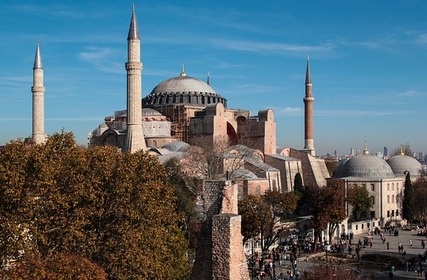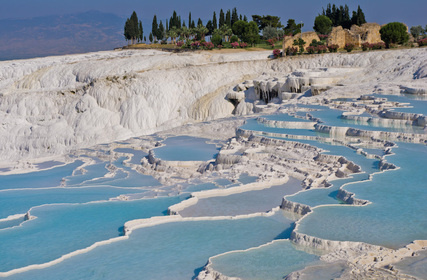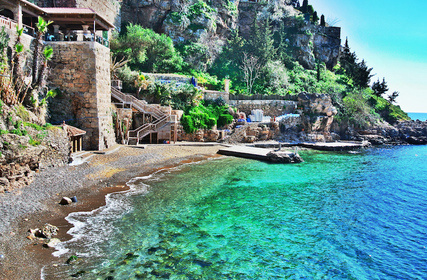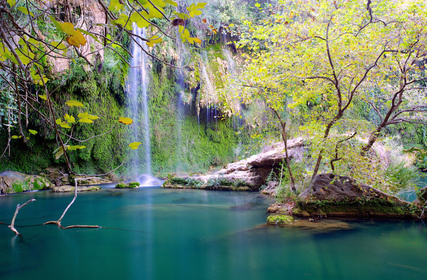Most popular locations in Turkey
-
Milas
-
Diyarbakir
-
Ankara
Ankara, a lively metropolis, is the capital of Turkey and the second largest city (after Istanbul). Often overshadowed by Istanbul, Ankara is a destination in its own right. Home for thousands of ...
-
Hatay
-
Dalaman
-
Istanbul
Istanbul is one of the world’s top tourist destinations, and as one of the world’s largest cities by population and it’s easy to slip into life as a local when you can roam a city that doesn’t slee...
Turkey is located at the northeast end of the Mediterranean Sea in southeast Europe and southwest Asia. A culturally rich country that crosses two continents, Turkey excites visitors with a mix of religious heritage, friendly people, picturesque landscapes and archaeological ruins.
Whether you prefer cruising on the Bosphorus admiring Istanbul’s domes and minarets, hot air ballooning at dawn over the caves of Cappadocia or swimming in turquoise waters at a resort on the Aegean coast, Turkey will capture your heart and soul on your next adventure.
A brief history
Turkey has seen millennia of conquering and civil wars and has been occupied by the Indo-European Hittites, Phyrgians, and Lydians.
It was once the center of the Roman Empire when Emperor Constantine moved the empire to the city of Constantinopole, now modern Istanbul. Occupation followed by the Byzantine Empire and the Ottoman Empire which lasted 600 years and resulted in prolific creation of literature, art and architecture.
Sitting on the last stage of the Silk Route that linked Europe with Asia, many merchants and explorers decided to stay and bestowed a cultural imprint that visitors to Turkey can witness today in art, ancient customs, archaeological ruins and modern daily life.
When to go
Turkey’s geographical location imparts generally temperate climatic conditions, however the presence of the mountains results in differences in climate between regions. In general, the coastal areas have milder climates, while the inland plateaus have stifling hot summers and harsh cold winters.
Spring (April to May) and autumn (September to October) are great times to visit Turkey, especially Istanbul and the Aegean and Mediterranean coasts as the climate is excellent. Peak season is mid-June until early September when prices increase and crowds swarm to the coastal resorts.
Bear in mind that eastern Turkey experiences extremes of weather – high temperatures are common in July and August, and from late October you can expect chilling temperatures and road closures from snow.
One of the greatest surprises for tourists to Turkey are the variations in plant life which you will see no matter what season you visit. Turkey has over 3000 endemic flowering species, you’ll also find coniferous trees, tropical palms, tobacco plants and harvest trees drooping with pears, cherries and hazelnuts.
Getting around
Turkey is a large country with a list of transport options ranging from buses, trains and ferries to rental cars, bikes and planes.
There are good links for buses and trains between surrounding countries, though you need to be aware that border crossings via public transport may experience delays due to paperwork and baggage checks of passengers. Check any timetables in advance, and be prepared for lack of restaurant cars on trains or facilities.
Internally, coaches travel between large towns and you may ride a dolmus, a bus for short trips that is filled with locals, tourists and sometimes livestock!
You can also take a ferry or fly in a seaplane though all schedules must be checked as they are subject to change.
Renting a car is a great option, particularly if you like adventure and aren’t bound to a set itinerary. Roads in main towns and cities are a good standard, and tolls on highways are usually paid via a microchip on the windscreen so check with your rental company if that applies. It’s advisable to book a GPS, especially when driving in cities and keep in mind that the Turkish often move in large groups on set days – for example, Fridays are the main prayer day for Muslims so traffic will increase as people head to mosques.
Meet the locals
Turkish people have a generosity of spirit and are infectiously good-natured. You will enjoy watching animated conversations on street corners, sampling new food at markets or meeting new friends who are proud of their country.
Immerse yourself in one of the largest markets in the world – the chaotic and colorful Grand Bazaar in Istanbul where you’ll walk under domed ceilings with hanging carpets, spice pots and racks of ceramics.
Admire the stunning Ottoman tile work at the Blue Mosque as the chants of prayers echo around the courtyards.
Visit a çay bahçesis (tea house) where you’ll spot locals playing backgammon amid the rising wafts from water pipes.
Jostle for a table at a local kebapçis (kebab restaurant) where you can eat delicious meze (Turkish starters) and drink raki (grape spirit with aniseed).
Culture & customs
Turkey is a melting pot of cultures that reflects in their social customs and traditions. Family, food and religion are important to Turks.
You may see traditional preparations for a family wedding, be invited to chat over Turkish coffee, or cultivate an understanding of the fasting during Ramadan.
Whenever you visit Turkey, you are sure to be planning your return to this diverse country.














